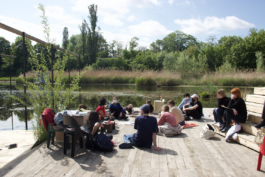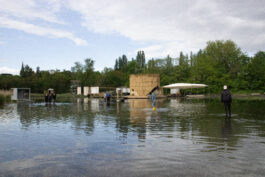



Eine Krise bekommen: Design und psychische Gesundheit
As part of the collective Eine Krise bekommen, I developed and implemented the multi-day workshop “Eine Krise bekommen: Design und psychische Gesundheit”, which explored the relationship between design practice and mental health. Together, we asked: How are creation and depression connected? What impact do endless night shifts have on us? How many of us experience burnout — and why is mental health rarely discussed in everyday university life? How do we want to work in the future? What kind of work ethic do our teachers convey — and how can we resist it?
Away from the university setting, we shared experiences during walks, spoke with designers and educators about how they cope with performance pressure, and collectively developed strategies for setting personal boundaries. With this focus, we discussed discrimination-sensitive options for action in small reference groups as well as in joint plenary sessions. From these exchanges, small interventions emerged that drew attention to the still largely invisible topic, challenged existing structures, and proposed alternative realities.
As the collective Eine Krise bekommen, we later reflected on the seminar in the article “Conversations continued … with Katharina Brenner, Luisa Herbst, Destina Atasayar and Lucie Jo Knilli” (2021), edited by Judith Lejdekkers and Lisa Baumgarten and published on the Teaching Design platform.
Concept & Implementation: Eine Krise bekommen (Destina Atasayar, Katharina Brenner, Lu Herbst & Lucie Jo Knilli)
Format: Multi-day Seminar, Studium Generale, University of the Arts Berlin
Location: Floating University, Berlin (DE)
Language: German & English
Year: 2021
Eine Krise bekommen: Design und psychische Gesundheit
As part of the collective Eine Krise bekommen, I developed and implemented the multi-day workshop “Eine Krise bekommen: Design und psychische Gesundheit”, which explored the relationship between design practice and mental health. Together, we asked: How are creation and depression connected? What impact do endless night shifts have on us? How many of us experience burnout — and why is mental health rarely discussed in everyday university life? How do we want to work in the future? What kind of work ethic do our teachers convey — and how can we resist it?
Away from the university setting, we shared experiences during walks, spoke with designers and educators about how they cope with performance pressure, and collectively developed strategies for setting personal boundaries. With this focus, we discussed discrimination-sensitive options for action in small reference groups as well as in joint plenary sessions. From these exchanges, small interventions emerged that drew attention to the still largely invisible topic, challenged existing structures, and proposed alternative realities.
As the collective Eine Krise bekommen, we later reflected on the seminar in the article “Conversations continued … with Katharina Brenner, Luisa Herbst, Destina Atasayar and Lucie Jo Knilli” (2021), edited by Judith Lejdekkers and Lisa Baumgarten and published on the Teaching Design platform.



